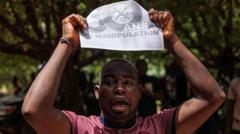The military junta in Mali has taken a decisive step in its crackdown on dissent by dissolving all political parties amid rising tensions and calls for a return to democratic governance.
Mali's Junta Dissolves Political Parties in Bold Move Against Dissent

Mali's Junta Dissolves Political Parties in Bold Move Against Dissent
Mali's military ruling party strengthens its grip by dismantling political opposition.
In a surprise announcement broadcast on state television, the junta led by Assimi Goïta declared, "All meetings of members of political parties and organisations of a political character are dissolved across the national territory." This declaration formalizes an ongoing trend of suppressing political activity since the military's takeover in the twin coups of 2020 and 2021. Despite promises of upcoming elections, the military leadership is set to remain in control for at least five more years.
The move to dissolve political parties is likely to provoke backlash from opposition groups, which have been advocating for a democratic return in Mali. This announcement follows a significant increase in repressive actions by the authorities, including the recent abduction of two opposition figures during a rare pro-democracy rally, purportedly by individuals posing as police officers.
Last month, a national conference, boycotted by notable opposition representatives, recommended that Goïta be designated as president until 2030, a proposition that drew substantial criticism from various human rights organizations and dissenting figures. The junta’s earlier commitment to holding elections in February 2022 appears increasingly uncertain.
The presidential decree issued on Tuesday warned Malians against disregarding the political parties' dissolution, though it did not specify any penalties for violations. It asserted that individuals engaged in political or administrative positions could continue their work without adherence to any party affiliation.
Responses from the opposition have varied, with some leaders like Nouhoum Togo, president of the Union for the Safeguarding of the Republic (USR), urging resilience in the face of suppression. "No matter how hard they try to make you invisible, your value doesn't depend on their recognition," he expressed on social media.
The dissolution follows a statewide suspension of political activity, recommended during the aforementioned national conference, and has incited outrage from opposition coalitions, including a hundred-party alliance that recently abandoned plans for protests against the military authority.
Since seizing power, Goïta has strengthened alliances with military-administrative leaders in neighboring Burkina Faso and Niger, strategically pivoting towards Russia while severing ties with the former colonial power, France. Additionally, Mali's withdrawal from the Economic Community of West African States (ECOWAS) — together with its northwestern neighbors — further underscores the junta's willingness to defy regional pressures to restore democratic norms.
The move to dissolve political parties is likely to provoke backlash from opposition groups, which have been advocating for a democratic return in Mali. This announcement follows a significant increase in repressive actions by the authorities, including the recent abduction of two opposition figures during a rare pro-democracy rally, purportedly by individuals posing as police officers.
Last month, a national conference, boycotted by notable opposition representatives, recommended that Goïta be designated as president until 2030, a proposition that drew substantial criticism from various human rights organizations and dissenting figures. The junta’s earlier commitment to holding elections in February 2022 appears increasingly uncertain.
The presidential decree issued on Tuesday warned Malians against disregarding the political parties' dissolution, though it did not specify any penalties for violations. It asserted that individuals engaged in political or administrative positions could continue their work without adherence to any party affiliation.
Responses from the opposition have varied, with some leaders like Nouhoum Togo, president of the Union for the Safeguarding of the Republic (USR), urging resilience in the face of suppression. "No matter how hard they try to make you invisible, your value doesn't depend on their recognition," he expressed on social media.
The dissolution follows a statewide suspension of political activity, recommended during the aforementioned national conference, and has incited outrage from opposition coalitions, including a hundred-party alliance that recently abandoned plans for protests against the military authority.
Since seizing power, Goïta has strengthened alliances with military-administrative leaders in neighboring Burkina Faso and Niger, strategically pivoting towards Russia while severing ties with the former colonial power, France. Additionally, Mali's withdrawal from the Economic Community of West African States (ECOWAS) — together with its northwestern neighbors — further underscores the junta's willingness to defy regional pressures to restore democratic norms.




















